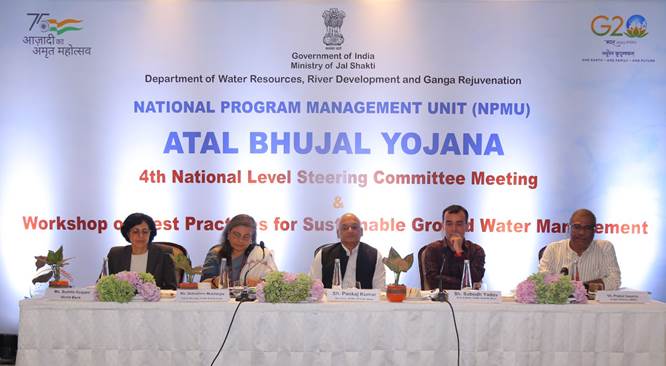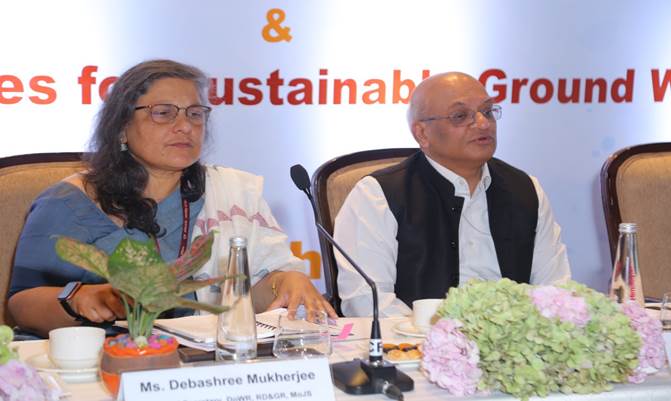Ministry of Jal Shakti
Secretary, Department of Water Resources Chairs Meeting Of National Level Steering Committee Of Atal Bhujal Yojana
Committee Decides Atal Bhujal Yojana Should Be Taken Up For Continuation For Another Two Years Beyond 2025
State Must Now Focus On Bringing Innovative Irrigation Technologies To Increase Water Use Efficiency: Secretary, DoWR
World Bank Praises Atal Bhujal Yojana For Bringing Water Use Efficiency At The Forefront & Progress Made During Last Three Years
प्रविष्टि तिथि:
26 MAY 2023 6:53PM by PIB Delhi
The fourth meeting of the National Level Steering Committee (NLSC) of the Atal Bhujal Yojana was held in New Delhi today under the Chairmanship of Secretary, Department of Water Resources, RD & GR, Ministry of Jal Shakti. Atal Bhujal Yojana (ATAL JAL) is being implemented as a Central Sector Scheme since April, 2020 in 8220 water stressed Gram Panchayats of 229 administrative blocks/Talukas in 80 districts of seven States, viz. Gujarat, Haryana, Karnataka, Madhya Pradesh, Maharashtra, Rajasthan and Uttar Pradesh for five-year period (2020-25).
The Committee reviewed the overall progress of the scheme and directed the States to expedite all the activities including procurement as well as convergence for the implementation of the interventions proposed under Water Security Plans (WSPs). The Committee noted that the scheme implementation was hampered by COVID during initial two years and given that community behavioral change is a time taking process, it was decided that the scheme should be taken up for continuation for another two years beyond existing time of the scheme.

Secretary, DoWR, Shri Pankaj Kumar stated that overall performance of the scheme is satisfactory and the achievements under Disbursement Linked Indicators are also noteworthy, however, the State must now focus on bringing innovative technologies in the area of irrigation in order to increase the efficiency of water. He instructed the States to map drinking water sources and carry out study to understand their sustainability and how interventions under Ata Jal can support these sources.

Since communities are at the forefront in this scheme, importance of capacity building of the communities was also emphasized. The Special Secretary, DoWR, Ms. Debashree Mukherjee highlighted the importance of assessment of quality of the trainings being provided at the Gram Panchayat level. She also requested all participating States to integrate WSPs in the Gram Panchayat Development Plans (GPDPs). This integration will provide sustainability to the approach followed by the scheme even after completion of time period.
The Practice Manager, World Bank praised the scheme for bringing water use efficiency at the forefront and noted the progress made during last three years. She emphasized on the importance of community led sustainable ground water management and lent her full support to the scheme.
The meeting was attended by Senior Officers of 7 States where the scheme is being implemented as well as Line Departments, who are members of the Committee. Special Secretary, and Joint Secretary, DoWR, RD & GR along with Water Practice Manager, South Asia, World Bank also attended the meeting. The NLSC Meeting was followed by Workshop on Best Practices on Sustainable Ground Water Management wherein all 7 States presented the best practices on ground water recharge, efficient water use, innovative technologies under irrigation, public disclosure of data etc. followed under Atal Bhujal Yojana in their respective State and how this scheme is bringing change in Ground Water Management with special focus on promotion of demand side interventions.
One of the key aspects of ATAL JAL is to bring in behavioral changes in the community, from the prevailing attitude of consumption to conservation & smart water management. Communities at the Gram panchayat level are being assisted in collecting water related data and then preparing water budget and Water Security Plans (WSPs). These Plans carry the wish list of the communities in the form of demand as well as supply side interventions to be implemented by various line departments under convergence. The scheme aims to bring all line departments working in the area of water at one platform so that the resources can be effectively utilized in implementing the WSPs. The scheme also emphasizes on such interventions which reduces the demand of water in irrigation and bringing 4.5 lakh Hectare irrigated area under efficient water techniques such as drip/sprinkler, irrigation through pipeline, mulching, crop diversification, etc. The scheme is being implemented in the challenge method wherein states performing well can be released more incentive fund. These performances are being measured through pre-defined targets called Disbursement Linked Indicators and forms the basis of incentive disbursement to States.
*****
AS
(रिलीज़ आईडी: 1927572)
आगंतुक पटल : 3357